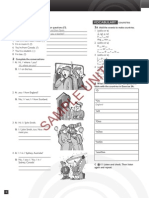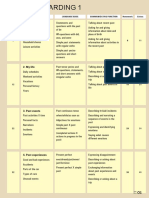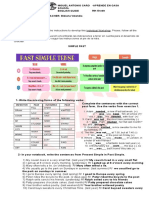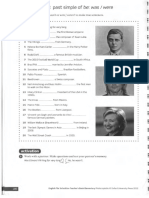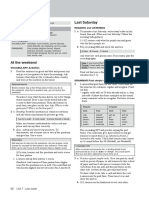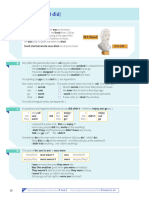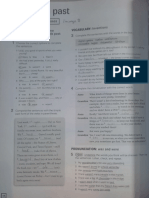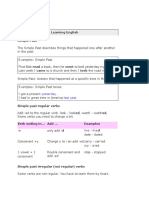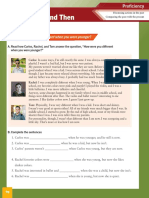0 ratings0% found this document useful (0 votes) 84 views10 pagesUnit 7
Copyright
© © All Rights Reserved
We take content rights seriously. If you suspect this is your content,
claim it here.
Available Formats
Download as PDF or read online on Scribd
SPEAKING 71 Find out where people were in the past 7.2 Talk about the past BIBI
cota ret
LISTENING 71 Listen to people talk about New Year 2000 7.3 Listen to people give ASWIEES Sos
opinions 7.4 Watch a BEC programme about the Chilean miners ee
Senne!
ae oe LeRoi
i
aw
, a c=
WRITING 71 Improveyour punctuation 7.4 Write a history quiz�WHERE WERE YOU?
LISTENING
L.A Workin pairs and look at the photo. What time of
‘year is it? What do you usually do at ths time of year?
B )7.1 Listen to people talk about New Year
2000. Match the speakers with the places.
Speaker 1 ee hie
Speaker 2 at home
Speaker 3 at work,
‘Speaker 4 in hospital
Speakers on a beach
€ Listen again, Who talks about
a) family? 1d) music? g) money?
b) friends? e) a sunrise? fh) hospital?
©) fireworks? 1) aparty? 1
CTT
PAST SIMPLE: WAS/WERE
2 A Underline the correct alternative in these
sentences about New Year 2000.
11 am/was at home. There is/was a family party
2 We are/were in Miami
3 We aren't/weren't alone.
4 Was/Were the party for me?
B Complete the tables with was, wasn't, were
or weren't.
WHe/Shet | () _was ahane
Q___|atwork
You/We/They | (+) tired.
0
Was he here?
you in class?
ves, he
No, he
we a
3A D)72 Listen to the sentences and mark
the stress,
1 Iwas at home. 4 They were here
2 We were tired. 5 He wasn't well,
3 Shewasatwork 6 Youwerentt in class
B WEAK AND STRONG FORMS: was/were Listen again
to the pronunciation of was /waz/, were /wa/,
wasn't /woznt/ and weren't /ws:nt/. Which are
weak (unstressed)? Which are strong (stressed)?
Listen again and repeat.
[> page 130 LANGUAGEBANK
(Cee
(> ee eee?
rare te
Paaverars Tenens
4A Underline the correct alternatives.
1. Where was/were you last New Year? Was/Were you
alone or with friends?
2. Was/Were you and your friends at a concert last
New Year?
3. Was/Were there a party on your last birthday? Where
was/were it? Was/Were your fiends at the party?
4 What was/iwere the last public holiday in your
country? Where was/were you? Who was/were
there?
B Complete the answers to questions 1-4 above.
Use was, wasn't, were or weren't.
a)|_was_ ona mountain in Slovakia.
alone - there twenty friends with me.
b) No, we We at a party on a boat
‘on the Amazon River.
©) Yes, there but it a big party
because my fla’s very small
4) Our last public holiday __ Thanksgiving.
We at my brother's house. My parents
there because they onholiday
in Jamaica.
€ Work in pairs and take turns. Ask and answer
questions 1-4 from Exercise 4A.
‘A: Where were you at New Year?
B: [was in Lima, Peru
‘A: Were you alone?
B: No, | wasnt. was at a party with people from work
What about you?
speakout TIP
Three questions are very useful to help you to have a
good conversation: What about you? How about you? And
‘you? Wirite these questions in your phrasebook�VOCABULARY
DATES
5 A Number the months in order.
September, June February,
March December October
January _1 july August
May November Anvil
13. Listen and check. Then listen and repeat.
C Work in pairs and take turns, Student A: say a month. Student B:
say the next month,
A: May
B: June
G A Write the numbers.
1 fifth Sth 7 thirty-first
2 second _ 2nd 8 eighth
3 ninth 9 first
4 twentieth 10 twenty-second
5 fourth 11 fifteenth
6 third 12 twelfth
B [)74 Listen and number the dates in the order you hear them.
15th October __ sth August
1st December 1 21st September
16th April 25th March
€ Listen again and repeat the dates.
the first of December
? A Work in pairs, Write three important dates in your life or in your
country, Student A: say the dates. Student B: write the dates down,
B Ask each other about the dates.
B: Why is the nineteenth of March important?
A: Its my birthday.
[>page 145 PHOTOBANK
vAl
8 A itis Monday at 9a.m. Number the
past time phrases in order.
a) last Friday
b) last month
©) yesterday evening 1
d) this time last year
) on Saturday afternoon
B Work in pairs and take turns. Ask
about the times in Exercise 8A.
A: Where were you last Friday?
B: Iwas at home,
WRITING
PUNCTUATION REVIEW
9A Match 1-5 with punctuation marks
a)-e).
1 comma
2 fall stop
3 exclamation mark
4 question mark
5 capital letter
B Read the email. Where's Jane?
Where's Paola?
Hi paola !__
How ere you"___I'mfine and 'min *****
with matt? We're on holiday here*_
Yesterday we were at the opening of the
olympic games *__ Was it on television
initaly® twas great’ There
was dancing '__ singing and fantastic
fireworks?
Here’s a photo
Write soon
Best wishes
jane
C Complete 1-12 in the email with
punctuation marks. Then change six
letters to capital letters.
10 A Write an email from a special place
and a special time. Write three things
about the place but don't write the
name of the place.
B Work in groups and read other
students’ emails, Guess the place.�72
VOCABULARY
ACTIONS
1A B75 Listen and write the
number next to the action you hear
stop arrive
start 1 travel
walk ae wy
play tennis talk
move home wait
B Workin pairs. Student A: act or
draw one of the verbs. Student B: say
the verb
2 A Lookat the photos. Where are the
people and/or the places?
B Read the text and write the
headings in the correct place.
Nonstop tennis match
Woman walks for eleven years
Man talks Fr si days
Grandmother sails round world
C Read the article again and write
the names.
1 She moved twenty-four times.
Fyona Campbell
She tried it three times,
People listened to him.
He played tennis with Daniel.
She didnt stop.
He waited,
They were very happy but tired.
B She was in Africa.
D Read the article again and correct
the mistakes in the notes below.
talking: 159 Hours, 2¢ ulnates,
sa seconds
salling: 295 days
playing tennts: 52 Kours, th minutes,
g seconds
walking: $2,000 metres
RECORD BREAKERS ahs
regular verb
ndings
1
Arvind Mishra of Dehradun, India talked about scientitc
mputations far 159 hours, fo! minutes ancl fit
sconds from ist to 6th March, 2014. One audience me
sald, ' listened for thirteen hours and waited for the e
but Professor Misha didnt stop! After six days Mishra finally
stopped, and now he has the world record!
TINY
PAST SIMPLE: REGULAR VERBS
3A Read the article again and find the past form of the verbs below.
1 startstarted 4 play Tt 10 finish
2 talk 5 wait 8 stop 11 want
3 arrive 6 move 9 travel 12 ask
B Complete the table.
B| To make the past simple with regular verbs:
B spelling examples
started
most verbs add
played
verbs ending in-e | add
verbsendingin | change to
consonant +-y
verbsendingin [double thefinal stooped
consonant + vowel | letter, then add
+ consonant
© Look at the sentences and complete the rule.
Professor Mishna didn't stop!
They didn't answer our question.
| Use
+ verb to make the negative of the past simple.�3
Carlo Santelli and Daniel Burns
played tennis for thirty-eight hours,
two minutes and nine seconds
‘on 1oth May 2010 in Clifton, New
Jersey, USA. We asked them
about the winner but they didn't
‘answer our question. Winning wasn't
important to them. They only wanted to
break the world record,
Flyona Campbell travelled around the world in
eleven years The amazing thing is that she
walked almost all the 52,000 kilometres. In Alrica,
she started in Cape Town in 1991 and arrived
in Tangiers in 1993, Why did she walk so much?
Wel, maybe it was because of her chiihood:
she maved home twenty-four times before she
was sixteen!
6 A Make six true sentences about yourself, the
44 B)76 -ed ENDINGS Listen to the pronunciation
‘of the verbs and write them in the correct place.
1 talked
ial eee teacher and a friend in the past.
jd started 1
The teacher
B D)7T Listen and check. Then listen again !
and repeat. ;
ive
D> page 130 LANGUAGEBANK watch (TV/a film)
stay
5 A Complete the sentences with the past form of + talk
the verbs in brackets. walk
ex
1 He (lve) here when he was a boy, but
then he (move) to the countryside nis {foctoolVennksa)
2 We (wait) for hours, but the bus alone
(not artive). 4+ eh) ny fami
3. My friend (cook) dinner last night and (with/to) me
(with/to}
Ireally Cike) it. i
4 Lusually drive, but yesterday | (walk)
because they (close) the road. n
5 The teacher (ask) me a question, but
I (not understand),
(watch) a very sad film last night and
(cry) the whole time.
B Work in pairs and take turns. Student A: close
your book. Student B: read the first part of the
sentences in Exercise 5A. Stop after the word in
bold, Student A: try to remember the end of the
sentence.
B: He lived here when he was a boy, but
A: then he moved to the countryside.
6!
H
* Write the name of a friend or student here.
B Change three of your sentences so that they
are false.
Work in groups and take turns. Student A: read
one of your sentences. Other students: say ifit's
true or false
‘A: Simon texted Lena yesterday.
B: False.
‘A: That's right. He did't text Lena, He texted me.�HOW WAS IT?
FUNCTION
ASKING FOR AND GIVING OPINIONS
L.A Workin pairs. Look at the pictures and discuss
the questions.
Where are the people? How do they feel?
B B)78 Listen to three conversations. Are the
conversations about a film (F), a party (P) or a
restaurant meal (R)? Write the letter.
2 2 3
C Listen again, Match phrases 1-6 with a)-f).
1 I's fantastic, a) steak
2 twas very good. b) chicken
3 Wsterrible. 9) Warren's party
4 twas boring. d) ice cream
5 It wasn't very good. @) film
6 Delicious, ) Adam’ party
2 A D)79 Put the words in order to make
questions and opinions. Then listen and check.
1 Az was / your/ How / steak?
How was your steak?
B: Delicious / right. /just
2 A: your/ was / chicken? / How
i good. / It / very / wasn't
:: cream? / ice / the / of / What / think / you /do
5 Fantastic 5/1
4 party? / was / the / How
B: boring. /It/ was
B:
3A:
B:
B Underline two or three stressed words in each
question or phrase above.
€ Listen and check. Then listen again and repeat.
D Workin pairs and practise the conversations.
[>page 130 LANGUAGEBANK
pe
@ intonation
eee
VOCABULARY
ADJECTIVES
3A Write the adjectives in the correct group.
allright terrible fantastic great delicious
not very good boring interesting awful
not bad
+ = +/-
fantastic terrible alright
B Work in pairs and answer the questions about
the adjectives above.
1. Which four adjectives mean very good (VG)?
2 Which three adjectives mean very bad (VB)?
3 Which adjective is only for food (F)?
fantastic VG
€ B)7.10 Listen and underline the stress in the
adjectives. Then listen and repeat.
allright
Work in pairs and look at photos A-C. Describe
the food, the party and the film.
A | think the food is
4 A Write the name of a person, place or thing for
each adjective in Exercise 3A.
fontastic-Daniel Craig. boring - golf
ail ight ~ my town
B Work in pairs and take turns. Student A: say
a person, place or thing on your lst. Student B:
guess Student As adjective
A: Golf
8: Great?
A: No.
8: Boxing?
A: Yes. think golfis really boring. What about you?
D> page 145 PHOTOBANK�LEARN TO
SHOW FEELINGS
5 A B)7A1 Listen to the questions and opinions
‘again. Does speaker B feel positive (4) or negative (-)?
1 2 3 4
B INTONATION Listen again. Is speaker B's voice
high (H) or tow (L)?
speakout TIP
When you give an opinion, use high intonation for a
positive feeling (Beautiful) and flat or low intonation for
a negative feeling (Terrible!)
2 oa
Beautifull Terrible!
Workin pairs and take turns. Ask and answer
‘questions using the words below. Use high or low
intonation in your answers.
How was,
the film? great
the concert? fantastic
the party? delicious
your party? not very good
the food? terrible
your weekend? awful
very nice
boring
‘A: How was your holiday?
B: It wasn't very good.
6 A Add words to make a conversation.
Student A
Where / you /last night?
Student 8
1/g0 /to the Adele concert.
Lv
How / it?
‘Ny
It/ fantastic! | /love/ it.
“
How / be / Adele?
u
She / be / great.
“
Yes, she / be / very good.
N
‘And you? Where / be / you?
ie
1/ go /to the cinema / to
see (name of film)
How / be
“
It/OK but (name of
actor/actress) / be / great
‘A: Where were you last night?
B: I went* to the Adele concert
“went = the past of go
BB Workin pairs and take turns. Role-play the
conversation
C Work with other students. Change the
conversations to talk about a restaurant, a party,
a class, a different film, or a different concert.
‘A: Where were you last night?
was at the new Chinese restaurant.
A: Ob, how was it?
? Work with other students. Ask and answer about
last weekend.
‘A: Where were you last weekend?
B: Iwas at my brother's house.�) THE CHILEAN MINERS
aun
Work in pairs and match the words in the box Watch the DVD, Was the last man out of the mine
with pictures A-H, an ill miner, the oldest miner or the boss?
‘adrillA aminer atunnel amicrophone Complete sentences 1-6 with words from the
anote underground the surface _an accident box below. Then watch the DVD again to check
your answers,
seven days worked families travelled rescue
1 Thirty-three miners were underground, __seven,
hundred metres underground,
2 The miners to keep healthy and
positive,
3 The miners’ watched and waited.
4 The tunnel was finished. The started.
5 One by one the miners to the surface.
6 Aitersixty-nine___, the miners were free.
Work in pairs and look at the sentences. What
does the underlined word in each sentence refer to?
Then watch the DVD again or read the script and
check your ideas. k
Read the programme information about the 1 They listened to microphones.
Chilean miners’ rescue and complete the summary. 2 [twas from the miners
3. We are well in the shelter.
4 The world watched with them
The Chilean - 5 Itwaseighteen minutes
Mineihbestae le was the boss.
In 2010 there was an accident at a mine near
Copiapé, Chile. Thirty-three miners were
E underground at the time. Were they dead or
me alive? For seventeen days, their families and
friends waited. Then, on Day 17, anote arrived
from the mine: it was from the men. They were
|) OK. Workers drilled down to the miners for
‘many weeks. People around the wortd watched
|) and waited. Finally after sixty-nine days, one
| _byone, the miners travelled to the surface
‘They were free! Watch their story on
tonight’s Newsround,
In_2010 miners were underground
for ays at a mine in Chile. For the first
days, no one knew they were alive.�LL
out doa quiz
Work in pairs. Put the news events on the
timeline.
a) Nelson Mandela died
b) The Japanese tsunami
©) Google started
4) The first man on the moon
Saar EEEEEnEPeTIaE?
19691975 1987 1996-2007 2011 2013,
[B)7:22) Listen to two people doing the task
and check your answers
Listen again and tick the key phrases you hear.
PHRASES
ese tsunami] was [first/next
Yes, | agree
don’t know/1'm not su
le was [before/after] the Japanese
Which date?
femember it we
Let's check thi
We were [right/wrong] about [three answers
Google.
Work in groups. Do the quiz on page 151. Use the
key phrases to help.
back a history quiz
Read and answer three questions from a quiz.
When were the first modern Olympic Games?
a) 296 b) 1896 ©) 1996
Which US president’s father was also president?
a) George Washington b) George W. Bush
©) Barack Obama
Why was Evita famous?
a) she was a politician b) she was a pop star
©) she was a sportswoman
What was Picasso's first name?
a) Pueblo b)Pierte¢) Pablo
‘See answers atthe bottom of the page.
Work in pairs and write three more questions
about famous people, places and events. For each
question, write three answers, one true and two
false. Use the questions in Exercise 4A and the
prompts below to help.
When was/were ...?Who was/were ..?
Where was/were ... ?What was/were ... ?
Which (king, queen, president, country, etc) was
Work with a new partner and take turns, Ask and
answer your questions. Use the key phrases to help.�75 (( LOOKBACK
CZs
L.A Write the questions for 1-8.
Find someone who ...
1 was very happy yesterday.
Were you very happy yesterday?
2 was tired this morning,
3. wasiin the town/city centre at
the weekend.
4 was here in the last class,
5 wasin a café before class.
6 was ona train at eight otc lock
this morning.
7 was late for something
yesterday.
8 wos ill yesterday.
B Workin groups and ask the
questions. If student says yes,
write his/her name.
‘A: Were you very happy yesterday?
B: Yes, Iwas. It was my birthday.
Py
2 A Write today’s date,
B write the dates for the time
phrases below.
1 yesterday
2 last year
3 last month
4 last Saturday
5 last Tuesday
6 last night
C Work in pairs. Student A: say
a time phrase from Exercise 2B.
Student B: say the date.
D Write a different date and
repeat Exercise 2C.
Wednesday, 11th March 20lyear}
A: Yesterday.
B: Tuesday 10th March 20lyear]
‘A: Last year,
B: 2olyear)
Oar
3 A Put the letters in the correct
order to make actions. Start
with the underlined letter.
1 twiawait 6 vertal
2 ktla 7 rats
3 yt 8 klaw,
4 veriar 9 vemo hemo
5 psot 10 yalp senti
B Complete the sentences with
one of the actions above.
1 We move home every year.
2 Inever late for lessons.
3 My day at 6am
4 The teacher sometimes
t00 fast.
5 Sometimes! to work,
sometimes | drive.
6 Lusually by carin the
city,
7 Nalways new food in
restaurants,
8 Inever ‘when someone
is late for a meeting,
9 Idon't often but!
watch matches on TV,
20 | often and look at my
watch,
C Workin pairs. Which of the
sentences in Exercise 38 are
true for you? Change the other
sentences to make them true.
SAUNAS
4 -A Change the verbs to the past
form,
1 watch ed_a film on a plane
2 wait___fora bus
3 phone someone
4 ask___a question on the
internet
5 play__withachild
6 study English grammar
7 stop___ someone on the
street
8 try__ something new
B Workin pairs. Ask and answer
questions with the phrases
above. Start your question:
When was the last time you ..
‘A: When was the last time you
watched a film on a plane?
B: Last year. | was on a plane from
Madi to Berlin. The film was
Sr sani3
5 A Add the vowels to the
adjectives.
_ilr_ght
retaty ceed
won th d
B Work in pairs and make
short conversations. Use the
adjectives above and words in
the box.
thefilm the food thematch
the concert the lesson
A: The concert was terrible!
B: Yes, it was awful.
Pay
Maan te)
6 A Put the sentences in order to,
make a conversation.
B: Because the food was terrible.
‘And how was the film?
B: He's not bad
B: It wasn't very good. 2
A: Yes, | think he's all right too.
‘Why not?
\: It was great, really good. Hey,
what do you think of our new
manager?
Hi, Pete, how was the
restaurant last night? 1
B Work in pairs and practise the
conversation.



